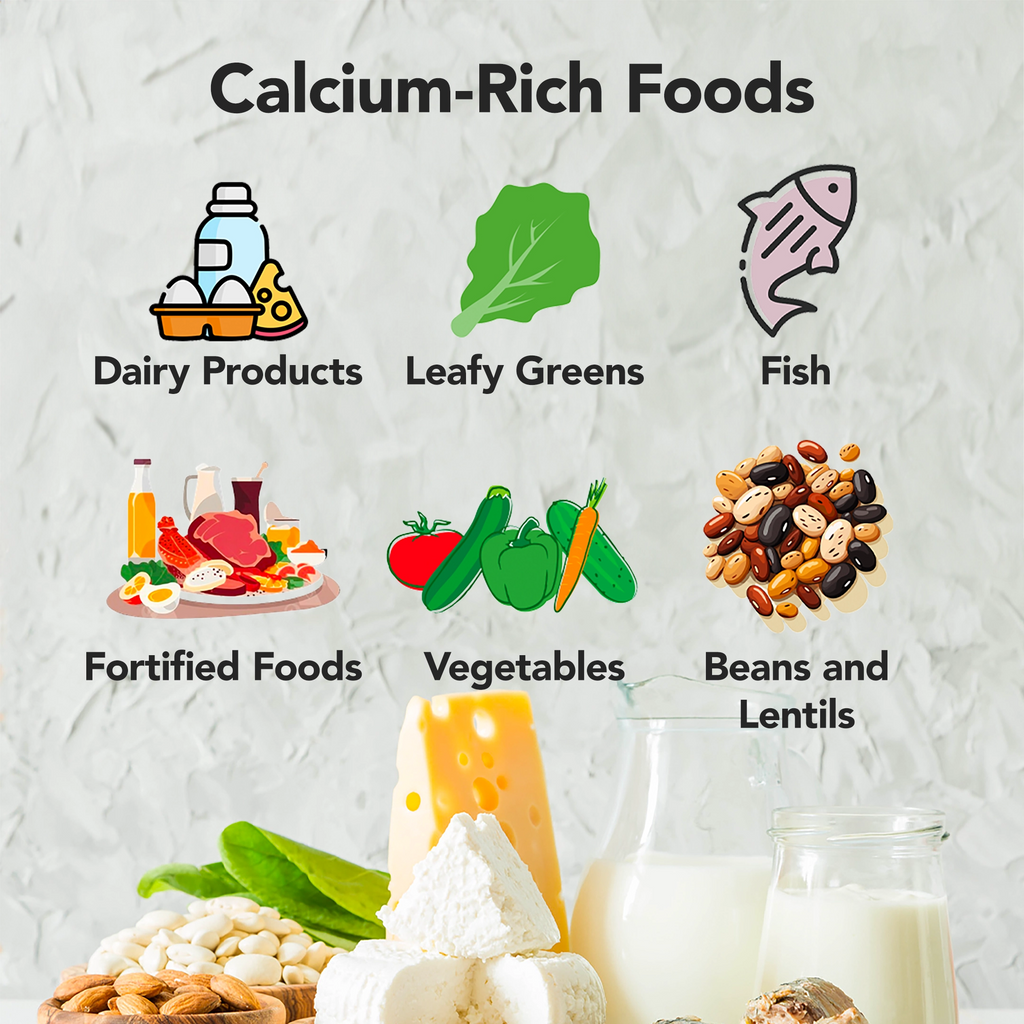
What Are The Best Calcium Supplements?
Calcium, the most abundant mineral in the body, plays an essential role in maintaining strong bones, supporting muscle function, regulating nerve impulses, and aiding blood clotting. Yet, despite its significance, many people in the US don't consume enough calcium, according to the National Institutes of Health (NIH). According to the Dietary Guidelines for Americans 2020-2025, nearly 60% of adult women and 30% of adult men don't get enough calcium.
While a well-balanced diet rich in dairy products, leafy greens, and calcium-fortified cereals can contribute to daily calcium needs, factors such as lactose intolerance or dietary restrictions may make it difficult to meet daily requirements. That's where calcium supplements come in.
In this guide, we'll explore the types of calcium supplements, considerations when choosing them, and the best calcium supplements available to help you select the ideal supplements for your optimal health.
Types of Calcium Supplements

Calcium supplements come in various forms, each with different characteristics. Here are some common types:
Calcium Carbonate
Calcium carbonate is the most common and inexpensive calcium supplement. It's also the most concentrated, containing about 40% elemental calcium. It depends on gastric acid for absorption, so it's best taken with meals. However, this makes it unsuitable for people with low gastric acid or individuals taking acid-reducing medications.
Also, while calcium carbonate supplements rarely result in side effects, they can cause gastrointestinal issues like bloating, constipation, and heartburn in some people.
Calcium Citrate
Calcium citrate is another popular supplement choice, containing about 21% elemental calcium. It's often preferred over calcium carbonate because it's easily absorbed and can be consumed on an empty stomach, making it ideal for people with low gastric acid or those taking acid-reducing medications. It's also less likely to result in gastrointestinal side effects compared to calcium carbonate. However, calcium citrate is generally more costly than calcium carbonate.
Other Forms
Some other less popular types of calcium supplements include calcium lactate and calcium gluconate. The latter contains about 9% elemental calcium, while the former contains 13%. Chewable tablets often use these forms of calcium because they are palatable and soluble. However, their lower elemental calcium content may make them insufficient for many people's dietary needs.
Factors to Consider When Choosing Calcium Supplements
With numerous calcium supplements available, selecting the right supplement can be challenging. That said, here's what to look for in a calcium supplement:
Dosage
The recommended daily intake (RDI) of calcium varies based on age and gender. Generally, calcium requirements range from 1,000 to 1,200 milligrams for most adults. However, individuals with certain health conditions may require higher doses.
Supplement Type
There are primarily two types of calcium in supplements: calcium carbonate and calcium citrate. Calcium carbonate is more widely available, inexpensive, and contains a higher concentration of elemental calcium. However, gastric acid is necessary for the absorption of calcium carbonate, so one cannot consume it without food. Also, it may cause gastrointestinal issues like bloating, constipation, and heartburn in some individuals.
Conversely, calcium citrate is more costly and contains a lower elemental calcium concentration. However, it doesn't require stomach acid for absorption, making it ideal for people with low levels of stomach acid or those taking acid-reducing medication.
Supplement Form
Calcium supplements come in various forms, including tablets, capsules, chewables, powders, and liquids. Liquid supplements are a perfect option for people who have difficulty swallowing pills and those who don't like the bitter aftertaste of most pills.
Additional Ingredients
Many calcium supplements contain extra ingredients like vitamin K and magnesium, which are pivotal in enhancing bone health. Some supplements also include vitamin D, which can enhance calcium absorption. If your intake of these other nutrients is also low, consider choosing a supplement with these additional nutrients.
Also, check ingredient labels and avoid calcium supplements that contain high amounts of additives, preservatives, and artificial sweeteners.
Potential Interactions
Calcium supplements may interact with certain prescription medications, such as bisphosphonates, antibiotics, and blood pressure medications. Consult your doctor if you're taking any medications to rule out any possible interactions and identify the right calcium supplement.
Quality and Third-Party Testing
Look for calcium supplements created by a reputable brand that adheres to stringent quality control standards. Also, look for products that have undergone third-party testing and have certifications from organizations like the United States Pharmacopeia (USP) or NSF International, which ensure the efficacy and safety of the product.
Our Best Selling Calcium Supplements
At Liquid Health, we offer a variety of calcium supplements for men, women, and children. Here are some of our best-sellers.
Calcium & Magnesium

Our Calcium and Magnesium supplement is ideal for anyone seeking to maintain bone health. Whether you're an athlete, have an active lifestyle, or want to prevent bone-related conditions, the formula is designed to improve bone and joint health and reduce the risk of fractures.
Uniquely formulated with calcium and magnesium nitrate, our Calcium and Magnesium formula is easily absorbed, making it ideal for people with low stomach acid or those taking acid-reducing medications. And best of all? It's a liquid supplement with a pleasant natural orange and vanilla flavor, making it a perfect calcium supplement for people who may find it challenging to swallow pills or find pills unpalatable.
Daily Multi-Mineral

Our Daily Multi-Mineral formula is ideal for individuals looking to supplement their diet with the vital minerals that may be insufficient from their regular diet. Besides calcium, our Daily Multi-Mineral formula contains other essential minerals like magnesium, zinc, and manganese. These minerals support various physiological functions such as muscle contractions, nerve cell function, and blood clotting.
Unlike conventional multi-mineral supplements that come in pill or capsule form, our Daily Multi-Mineral formula is available in a natural berry flavor liquid formula that's easy to swallow and tasty. Plus, it's entirely gluten-free and non-GMO, so it's perfect for vegans and individuals with dietary restrictions.
Complete Multiple

Our Complete Multiple formula is ideal for adults looking to supplement their diet with vitamins and minerals to meet their daily needs. Besides containing calcium, it's particularly rich in vitamin D3, which is integral to calcium absorption. It's also rich in folate, which can help prevent congenital disabilities like spina bifida and anencephaly, so it's one of the best calcium supplements for women.
And best of all? It's a liquid supplement with a delicious natural boysenberry pomegranate flavor. Plus, it's gluten and dairy-free, making it suitable for people with dietary restrictions or lactose intolerance.
Children's Complete Multiple

Many children find it difficult to swallow pills, and they can't tolerate their taste. Unlike traditional pill supplements that children may find challenging to swallow, our liquid formula is easy to drink and has a delicious citrus mango taste kids will love.
And away from its pleasant taste, our Children's Complete Multiple formula is packed with numerous vitamins, including vitamins A, C, D, and E, and minerals like calcium, zinc, and magnesium that are essential to the healthy development of children.
Our Children's Complete Multiple formula is also free from additives, preservatives, artificial sweeteners, gluten, and dairy, making it a great calcium supplement for kids with dietary restrictions or sensitivities.
Conclusion
You require adequate calcium to maintain bone health and your overall well-being. While taking calcium-rich foods can ensure you get enough calcium, calcium supplements can be an effective way to meet your daily calcium needs if you aren't getting enough calcium from your diet.
However, if you're considering taking calcium supplements, consult your doctor to determine whether or not you should start taking supplements, particularly if you have an underlying medical condition like kidney stones, hyperparathyroidism, or hyperacidity.
Optimize your health with Liquid Health’s trusted line of liquid vitamins and supplements. Whether you’re searching for Prenatal & Postnatal Support, Children’s Focus & Attention Supplements, or the Best Liquid Energy Vitamins, we have a solution for you. Browse our collections to find the perfect match for your health needs.
FAQs
What's the Most Effective Form of Calcium?
The most effective form of calcium depends on individual factors like dietary needs and health conditions. Calcium carbonate contains the highest concentration of elemental calcium, but it requires stomach acid for absorption, so it's best consumed with food. Conversely, calcium citrate contains less elemental calcium, but it doesn't require stomach acid for food, and it's easily absorbed, making it better suited for people with low stomach acid.
What Are the Symptoms of Calcium Deficiency?
The early signs of calcium deficiency often go unnoticed. However, prolonged deficiency can lead to symptoms like muscle cramps, brittle nails, and bone pain. In extreme cases, calcium deficiency may lead to osteoporosis, a bone disease that weakens bones, making them more susceptible to fractures.
Do Calcium Supplements Have Any Side Effects?
Calcium supplements, particularly calcium carbonate supplements, may cause gastrointestinal issues such as bloating, constipation, and flatulence. Excessive consumption of calcium may also result in adverse issues such as kidney stones or hypocalcemia. If you experience any side effects, consult your physician.
Is Vitamin D the Same as Calcium?
Vitamin D and calcium are different nutrients that support bone health. Vitamin D is a fat-soluble vitamin that's synthesized by the skin when it's exposed to sunlight. It's also present in oily fish, red meat, and eggs. Calcium is a mineral found in dairy products, leafy green vegetables, and calcium-fortified cereals. A deficiency in either vitamin D or calcium can negatively impact bone health.
Can Vitamin D and Calcium Be Taken Together?
You can consume vitamin D and calcium simultaneously. In fact, many calcium supplements also contain vitamin D, as it enhances calcium absorption and promotes bone health.


Leave a comment